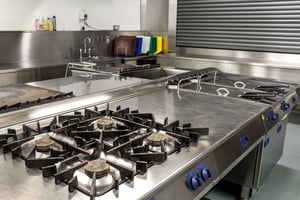 There are several tax policies geared at deducting major equipment purchases – such as Section 179 and Bonus Depreciation – but there’s another IRS rule McDonald’s Owners should know that applies to smaller expenditures for the acquisition or improvement of tangible property.
There are several tax policies geared at deducting major equipment purchases – such as Section 179 and Bonus Depreciation – but there’s another IRS rule McDonald’s Owners should know that applies to smaller expenditures for the acquisition or improvement of tangible property.
The IRS Repair Regulations are a way for McDonald’s Owners to deduct the costs of smaller purchases – such as muffin toasters, sweetener dispensers, etc., in the year acquired without impacting any accelerated depreciation limitation. But you need a specific accounting policy in place to take advantage of this benefit.
While repair regulation rules have flown under the radar since 100% bonus depreciation was passed as part of the Tax Cuts and Jobs Act at the end of 2017, it may be a useful tax planning tool again soon with bonus depreciation scheduled to begin phasing down each year starting in January 2023 and all the way to 0% by January 2027.
IRS Repair Regulations
The IRS repair regulations provide a so-called “bright-line test” to determine whether an expenditure should be capitalized and depreciated over time or expensed in the year of acquisition.
This regulation provides taxpayers with a definitive process for deducting incidental material and supplies. This is very relevant to McDonald’s Owners and can be used by making a de minimus election on a timely filed tax return.
READ MORE: Cash Flow Coverage Ratio: The Most Popular McDonald’s Ratio
What is the De Minimus Expense Election
The de minimus expense election is made annually. It which allows taxpayers to deduct the cost of the acquired item up to the lesser of $2,500 per item or the amount stipulated in the organization’s accounting policy. (The $2,500 threshold amount includes all transportation and tax expenses. Therefore it’s important that each McDonald’s Owner has a formal accounting policy which reflects the de minimus amount allowed by the IRS.
How McDonald’s Owners Can Use Repair Regulations
Here’s an example of how a McDonald’s Owner could benefit from the repair regulations:
- An Owner purchases 5 sweetener dispensers at $1,350 each for a total cost of $6,750.
- That total cost would be eligible to be expensed under the de minimus safe harbor because each dispenser is under the $2,500 threshold.
- The full $6,750 would be includable as a tax deduction in the year purchased without using any accelerated depreciation expense.
Here’s another example using the purchase of 8 table and chair sets:
- Each chair costs $250 and the table costs $1,000.
- Since there are 4 chairs to each table, the total cost per unit is $2,000 and the grand total on the invoice is $16,000.
- This entire cost is eligible to be expensed under the de minimus safe harbor – if each item is listed separately on the invoice – because each of the 32 chairs and the 8 tables cost less than the $2,500 threshold.
As shown above, this expense election can increase the annual write off of property acquisitions without any consideration of the annual accelerated depreciation limitations.
READ MORE: Understanding and Managing Financial Ratios for McDonald’s Franchisees
For More Information
Please contact us for assistance with documenting your accounting policies and to help answer any other questions about the IRS Repair Regulations to assist you in maximizing the benefit.





